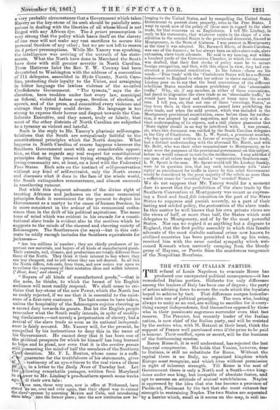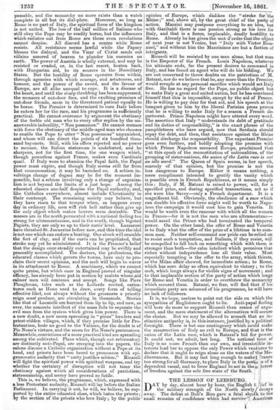THE STATE OF ITALIAN PARTIES.
Baron Ricasoli, it is well understood, has rejected the last Imperial compromise. He holds that Venice, however, dear to Italians, is still no substitute for Rome. Without the capital there is no Italy, no organized kingdom which Europe must recognize, and which lives without permission in right of inherent strength. Till Rome is the seat of Government there is only a North and a South—two king- doms under one king, but incapable of absolute fusion, and apt to assume an attitude of mutual watchfulness. Naples is oppressed by the idea that she has become a province of Piedmont, Piedmont by the fact that she must exhaust her strength in restraining Naples. The two States are separated by a barrier which, small as it seems on the map, is still passable, and the monarchy no more exists than a watch complete in all but its dial-plate. Moreover, so long as Rome is no part of Italy, the spiritual force of the kingdom is not united. The loss of the half million of Italians who still obey the Pope may be readily borne, but the influences which radiates out from Rome are those even revolutions cannot despise. All discord has a centre while Rome resists. All resistance seems lawful while the Papacy blesses the disloyal, and the Vicar of Christ sends out villains assured of heaven to plunder his enemies on earth. The power of Austria is wholly external, and may be resisted or evaded, or, in the last resort, beaten back, with Hungarian aid, to its sources in the Hereditary States. But the hostility of Rome operates from within, through agencies with which courage, and astuteness, and honour, and the power of the sword, and the favour of Europe, are all alike unequal to cope. It is a disease of the heart, and until the sharp throbbing has been suppressed, the menaces of out-door foes, and the exulting promises of out-door friends, seem to the threatened patient equally to be borne. The Premier is determined to cure Italy before he enters her for the race, and his programme is sufficiently practical. He cannot overcome by argument the obstinacy of the feeble old man who to every offer replies by the un- answerable imbecility, " Non possumus." He cannot menace with force the obstinacy of the middle-aged man who chooses to enable the Pope to utter " Non possumus" unpunished, and whose will can direct the points of six hundred thou- sand bayonets. Still, with his offers rejected and no power to menace, the Italian statesman is undefeated, and he sharpens, not for the first time, the one weapon which, though powerless against France, makes even Cardinals quail. If Italy were to abandon the Papal faith, the Papal power must expire, and though Italy seems still far from that consummation, it may be hastened on. A schism in- volvinga change of dogma may be for the moment im- possible, but a schism involving only a change of organiza- tion is not beyond the limits of a just hope. Among the educated classes one-half despise the Papal authority, and, like Catholics everywhere, almost include Christianity in their contempt. The remaining moiety may believe, but they have risen to that temper when, as happens every day in ordinary life, men will risk hell rather than give up the only object which makes heaven seem desirable. The masses are in the north permeated with a national feeling too strong for ultramontanism, and in the south, though bigoted Papists, they are only so up to their cures' level. Lazzaroni have thrashed St. Januarius before now, and this time the idol is not one which can endure a beating. One shock will crumble the feet of clay, and if the cures can be propitiated, that stroke may yet be administered. It is the Premier's belief that the design once steadily entertained may be swiftly and peaceably accomplished. The doctors, the professions, the educated classes which govern the towns, have only to pro- claim their secret opinions, and the mob will begin to waver in its attachment to Rome. A machinery, which we cannot quite praise, but which once in England proved of singular efficacy, has already been put in motion by zealots whose,aid calmer men will contemn and accept. Songs like Piers Ploughman, tales such as the Lollards recited, carica- tures such as Hone used to draw, every form of telling effective libel, not always without the grossness a priestly reign must produce, are circulating in thousands. Stories like that of Locatelli are hurried from lip to lip, and now, as ever, the concrete intellect of the mass fails to separate the evil man from the system which gives him power. There is a new doubt, a new scorn spreading in "pious" hamlets and priest-ridden villages, which, if they promise little for Pro- testantism, bode no good to the Vatican, for the doubt is of Pio Nono's virtues, and the scorn for Pio Nono's pretensions. Meanwhile, convictions of a more practical kind are spreading among the cultivated. Plans which, though not reformatory are distinctly anti-Papal, are creeping into the papers, the salons discuss a Catholic organization without a Pope at its head, and priests have been heard to pronounce with epi- grammatic audacity that "unity justifies schism." Ricasoli will fight the spiritual power with spiritual weapons, and try whether the certainty of disruption will not tame the obstinacy against which all considerations of patriotism, statesmanship, and mercy have proved so futile. This is, we believe, the programme, which, expressed with a less Protestant audacity, Ricasoli will lay before the Italian Parliament. In carrying it out, he will, we believe, be sup- ported by the entire educated class, which bates the priests ; by the section of the priests who love Italy ; by the public opinion of Europe, which dislikes the " stroke tot...the Rhine ;" and, above all, by the great chief of the party of action Mazzini may postpone everything to an idea, but with Garibaldi there is one passion strong as his love for Italy, and that is a fierce, implacable, deadly hostility to Rome. Already he has given the mot d'ordre that the object of next year is not Venice, but " Italy with Victor Ema- nuel," and without him the Mazzinians are but a faction of intrigants.
Ricasoli will be resisted by one man alone, but that man is the Emperor of the French. Louis Napoleon, whatever his ultimate ends, for the present desires to command in Italy, and has found an agent who will do his bidding. We are not concerned to throw doubts on the patriotism of M. Ratazzi, nor do we believe that he, any more than the Premier, would scruple at any personal sacrifice which would set Italy free. He has no regard for the Pope, no public object but to make Italy a great and united nation, but he has convinced himself that this is impossible, except by the aid of France. He is willing to pay dear for that aid, and his speech at the banquet given to him by the liberal Parisian press proves that he is willing to make Italy for a season a French de- partment. Prince Napoleon might have uttered every word. The assertion that Italy " understands its debt of gratitude and its duties of responsibility," is the exact phrase of the pamphleteers who have argued, now that Sardinia should repay the debt, and then, that assistance against the Rhine should discharge the responsibility. The expectant Premier goes even further, and boldly adopting the promise with which Prince Napoleon menaced Europe, proclaimed that " at this epoch of the reconstitution of nationalities, of the grouping of sister-nations, the union of the Latin race is not an idle word." The Queen of Spain seems, in her speech, scarcely of that opinion, but the promise is not the less dangerous to Europe. Either it means nothing, a mere compliment intended to gratify the vanity which is possible even in French Republicans, or it means simply this : Italy, if M. Ratazzi is raised to power, will, for a specified price, and during specified transactions, act as if she were like Savoy—only a French department. It is a magnificent bid. Obviously, the obedience of a race which can double his effective force might well be worth to Napo- leon the campaign it would cost him to gain Venetia. It would be worth even the rancour with which all the women in France—for it is not the men who are ultramontane- would assail the Prince who had terminated the temporal power. On the other hand, the offer of Rome and Venetia is to Italy what the offer of the prize of a lifetime is to com- mon men. Neither self-command nor pride can be relied on to resist such a temptation, and Italians, if they resist, will be compelled to fall back on something which with them is stronger than both—the calm intellect which perceives that riches without independence lose all their value. Most especially tempting is the offer to the army, which thirsts, as the Milan affair showed, for immediate action ; to Rome, which has seen delay so often equivalent to victory ; to the mob, which longs always for visible signs of movement ; and to that implacable section of the party of action which longs for Rome and Venetia in order to overthrow the monarchy which secured them. Ratazzi, we fear, will find that if his immediate party are ashamed of his programme, he will have no lack of followers.
It is, we hope, useless to point out the aide on which the sympathies of Englishmen ought to lie. Anti-papal feeling will here do more to support Ricasoli than reams of argu- ment, and the mere statement of the alternatives will secure the choice. But we may be allowed to remark that an in- stinctive antipathy is, in this instance, justified by a political foresight. There is but one contingency which could make the resurrection of Italy an evil to Europe, and that is the union of the Latin race, which is Ratazzi's bid for power. It could not, we admit, last long. The national tone of Italy is no more French than our own, and irresistible in- terests lead her to oppose the only Power which ventures to declare that it ought to reign alone on the waters of the Me- diterranean. But it may last long enough to makel ■rance too strong for all Germany, to place Italy in the posiio m of a dependent vassal, and to force England to act in then terest of freedom against the sole free state of the South.































 Previous page
Previous page